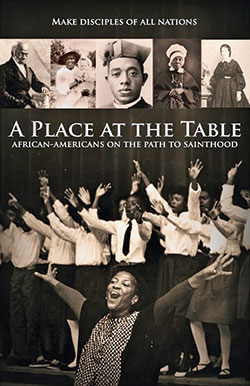Archdiocese licensed to share film on Black saints-to-be with parishes, schools
By Natalie Hoefer
 Currently there are 11 American saints. None of them are Black—but that could soon change. Six holy Black American men and women are on the path to canonization.
Currently there are 11 American saints. None of them are Black—but that could soon change. Six holy Black American men and women are on the path to canonization.
A Place at the Table: African Americans on the Path to Sainthood is a documentary about these six men and women released this year by Stella Maris Productions, LLC.
Recently, the archdiocesan Office of Intercultural Ministry obtained a two-year license to distribute the film to parishes and schools in central and southern Indiana and Catholic organizations affiliated with the archdiocese.
“The film tells about these six people and gives a better idea of how ordinary people can live holy lives,” said Pearlette Springer, archdiocesan coordinator of Black Catholic Ministry.
“But it also gives the historical background of what was going on in the country and in the Church during their lives and how that affected their struggles.”
Learning of those struggles touched Deacon James Wood, archdiocesan coordinator of catechetical resources, who worked with Springer to create study guides for adults and youths to accompany the documentary.
“The history of each person the film talks about is very well done,” he said. “It kind of tugged at my heart because of the struggles they had with racism, even in the Church, like [Venerable] Father Augustus Tolton, who wasn’t allowed to go to seminary in the United States because he was Black.”
Six Blacks on the path to sainthood
Father Tolton is the only priest among the six potential Black saints. He was born into slavery in Missouri in 1854. Later, as a free man, he was turned down by every seminary he applied to. He ended up attending seminary in Rome, where he was ordained in 1886. Father Tolton became the first American-born Black Catholic priest.
Another former slave on the list is Venerable Pierre Toussaint. He was brought to New York City as a Haitian slave in 1787. He gained his freedom in 1807 and became a successful, wealthy hairdresser. Toussaint used his resources to serve the Church and the poor.
Venerable Henriette Delille, born in Louisiana in 1813, was not a slave. But her Black heritage through her mother, who was one-quarter Black, prevented Delille from joining a convent. She donned a makeshift habit, assumed abject poverty and dedicated her life to nursing, feeding and educating slaves and others forgotten by society. She went on to found the Sisters of the Holy Family, the second-oldest surviving congregation of African-American sisters.
The oldest order of Black women in America, the Oblate Sisters of Providence, was founded by Servant of God Mother Mary Elizabeth Lange. Born in Cuba in 1789, she later moved to Baltimore where she founded her order—thus becoming the first Black mother superior in America.
Known as the “Angel of Charity” of Denver, Colo., Servant of God Julia Greeley was born a slave in Missouri and freed in 1865. She moved to Colorado and became Catholic in 1880. She was a daily communicant. She evangelized and delivered literature about the Blessed Sacrament in Denver. Greeley served as a secular Franciscan for the last 18 years of her life.
Another convert to Catholicism is Servant of God Sister Thea Bowman. She was born in 1937 and raised in a Methodist home. With her parents’ permission, she converted to Catholicism at the age of 9. At 15, she joined the Franciscan Sisters of Perpetual Adoration in La Crosse, Wis., and went on to establish the Institute for Black Catholic Studies at Xavier University of Louisiana.
This documentary is ‘sorely needed’
Springer said the film is best suited for those in fifth grade and older. By viewing the film and using the study guides she and Wood wrote, Springer hopes youths and adults gain three takeaways.
“First, I want folks to know there is always an opportunity for each of us to become saints,” she said. “Second is for them to know that becoming a saint is not an easy road. And third, I want them to gain a deeper sense of the Church’s call to social justice, that we’re here to serve God and God’s people. All six in the film have that in common.”
Wood said the documentary, which the archdiocese is licensed to distribute through April 30, 2024, is “sorely needed.”
“Until recently, I didn’t even know there were no Black saints in America or that there were Blacks on the path to sainthood,” he said. “I think it’s fantastic the archdiocese is making this documentary available.
“Those who watch it will learn about the rampant racism of the 19th century and how awful it was. It’s important to understand the history of slavery, but also the accomplishments of Black Catholics and how important they are to the Church.”
(For information on how to obtain a copy of the film and study guides for use by an archdiocesan parish, school or affiliated organization, and for materials and prayer booklets regarding the six Black men and women on the path to sainthood, contact Pearlette Springer at pspringer@archindy.org or 317-236-1474.) †
